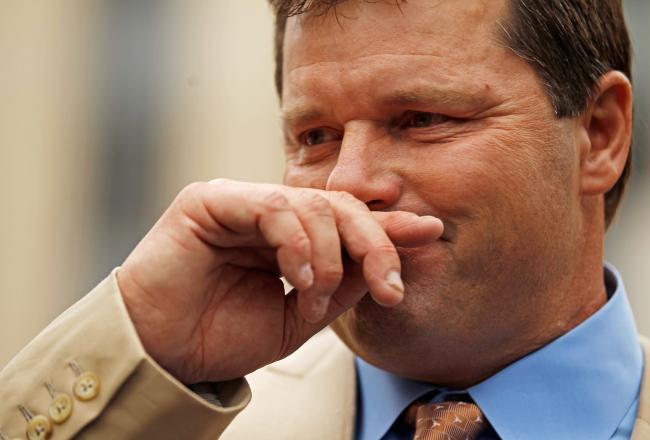
Let me be the first to say this about the Roger Clemens trial: I’m glad that’s over.
After numerous missteps, a mistrial, jury selections that never ended, and finally an acquittal I can honestly say I’m done with any and everything sports related in a federal courthouse that involves PED use.
Why federal prosecutors pursued this case in the first place is beyond me, but the fact that it drug on so long only to come to this conclusion is more annoying than upsetting in my opinion. Despite the evidence, despite all the statistical numbers, and even rock solid testimony from accusers of Clemens’ he walks away with a mountain of legal fees and a taxpayer-funded circus of a trial.
I’m not saying it was a waste of time. I’m saying it was a monumental waste of time.
The immediate question following this trial is, of course, does this verdict validate his Hall of Fame chances. My answer is an unbelievably firm “no.” It doesn’t make me any less skeptical of Roger Clemens. Did Barry Bonds getting off a few months earlier validate his status as a surefire lock now? If many of you are being honest your answer is no; and it’s for the same reasons as Clemens should be overlooked.
Wallace Matthews, a writer for ESPNNewYork.com, wrote a piece yesterday that took the words right out of my mouth. I encourage any and everyone to check it out here but a couple of points he made within the article struck me so hard as to cite them in my own post. First this:
“In the four previous seasons, Clemens posted the following numbers: 11-14. 4.46 ERA; 9-7, 2.85; 10-5, 4.18 and 10-13, 3.63. Thinking he was past his prime at 33, the Red Sox let him go.
After that, something happened to Clemens. In 1997 and 1998, he won 21 and 20 games, respectively, for the Toronto Blue Jays and won the Cy Young both years. Then began his Yankee Era, in which he posted five straight winning seasons and another Cy Young. Then, at age 41, he went to Houston, and over three seasons went 38-18, all with sub-3.00 ERAs, and one year posted a 1.87.
In fact, no pitcher in history has had the kind of success Clemens had after his 39th birthday, a period in which he went 79-41 with a 3.24 ERA.”
Most will cast that off as just some guy spouting numbers. Some will argue “who is he to say an old guy can’t get it done?” But what he brings up next is what I found to be most fascinating:
“Check out the records after the 39th birthdays of the pitchers whose final career numbers most closely mirror Clemens’: Greg Maddux, 50-52, 4.00-plus ERA; Tom Seaver, 38-35, 4.00-plus ERA; Steve Carlton, 29-44, 5.00-plus ERA; Randy Johnson, 79-60, 4.00-plus ERA.”
“Even Cy Young, who won 511 games, was barely a .500 pitcher after his 39th birthday (88-81).”
“Only Warren Spahn, who went 96-73 with a 3.52 ERA, even comes close, but he was a 5-foot-11, 175-pound screwballer, not the power pitcher Clemens remained till the end of his career.”
“Simply put, Clemens’ late-career performance simply doesn’t pass the sniff test any more than Bonds suddenly going from 49 home runs as a 35-year-old to 73 the following year smells awfully funny, positive drug test or not.”
The big knock on Bonds is his performance as a hitter at an advanced age. Wallace lays out the numbers on Clemens beautifully, and after doing so simply states:
“To believe them is to believe that Clemens just naturally worked harder and was a better pitcher than Seaver, Carlton, Maddux, Johnson and Young.”
So besides the trial being a waste of time and money the debate on his candidacy for the Hall of Fame is as well. Clemens was one of the most dominant pitchers we’ve ever seen. But the evidence against the legitimacy of that dominance is stronger than any case put up in court.
Check out the entirety of Chris Wallace’s Article on ESPNNewYork.com by clicking here
The only comment I’ll make is that Clemens didn’t have to face the designated hitter when he went to the National League, which can account for at least some of his improved numbers. What do you think?
LikeLike
Not facing the DH helps, but we’re talking a substantial gain. Before he left Boston he went 40-39 with an ERA of 3.77 ages 30-33. That is about the time pitchers would start slowing down. But between 1997 and 2005 (ages 34-42) he went 149-61. With a majority of those years coming in the American League. So no, I don’t fully agree with the argument that he was aided by the lack of a National League DH.
LikeLike
The stats you present make a pretty, darn compelling case.
LikeLike
Thank you! I try not to go at it completely blind. I appreciate the read!
LikeLike